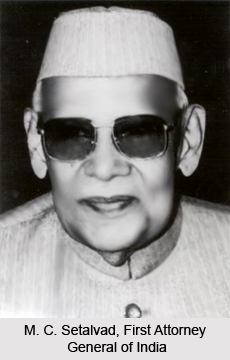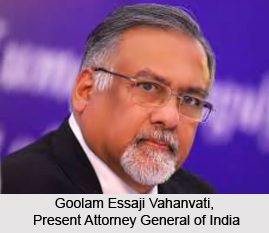 Attorney General of India is appointed by the Indian President under Article 76(1) of the Constitution of India and holds his office during the pleasure of the president. As the chief legal adviser to Government of India, attorney general is supposed to advice the government on all the legal issues that require hiss advice. In rendering his responsibility he shall be assisted by the Solicitor General of India along with a group of additional solicitor generals. Along with the attorney general of the centre there are attorney generals of respective states who are appointed by the governor of each state.
Attorney General of India is appointed by the Indian President under Article 76(1) of the Constitution of India and holds his office during the pleasure of the president. As the chief legal adviser to Government of India, attorney general is supposed to advice the government on all the legal issues that require hiss advice. In rendering his responsibility he shall be assisted by the Solicitor General of India along with a group of additional solicitor generals. Along with the attorney general of the centre there are attorney generals of respective states who are appointed by the governor of each state.
Attorney General of India like an advocate general is not supposed to be a political appointee in spirit but can attend a parliamentary session without the right to vote. The attorney general has the right to hold audience in every part of India and appears on behalf of the Government of India in all the cases including suits, appeals or other proceedings in the Supreme Court in which the government of India is concerned.
 He or She shall represent the government of India in any references made by the president to the Supreme Court of India under article 143 of constitution of India. The attorney general is supposed to be consulted only on legal matter of great importance and only after the Ministry of Law and Justice has been consulted. The attorney general can accept the briefs but cannot appear against the Government of India. He cannot at the same time defend any accused who bears a criminal record. Though the post of Attorney general is supposed to politically neutral, yet it faces a number of changes with a change of government at the centre. Whenever a party wins majority and comes to power, it selects its own law officers. At present Goolam Essaji Vahanvati has been appointed as the attorney general of India by the congress led government after the general elections of 2009.
He or She shall represent the government of India in any references made by the president to the Supreme Court of India under article 143 of constitution of India. The attorney general is supposed to be consulted only on legal matter of great importance and only after the Ministry of Law and Justice has been consulted. The attorney general can accept the briefs but cannot appear against the Government of India. He cannot at the same time defend any accused who bears a criminal record. Though the post of Attorney general is supposed to politically neutral, yet it faces a number of changes with a change of government at the centre. Whenever a party wins majority and comes to power, it selects its own law officers. At present Goolam Essaji Vahanvati has been appointed as the attorney general of India by the congress led government after the general elections of 2009.
Thus the attorney general of India is the chief legal adviser to the Government of India. He is supposed to equip the government with all the latest and relevant legal advises that shall provide a guideline to the government regarding the legal matters.
| M. C. Setalvad |
| C.K.Daphtary |
| Niren De |
| S.V. Gupta |
| L.N. Sinha |
| K. Parasaran |
| Soli Sorabjee |
| G. Ramaswamy |
| Milon K. Banerjee |
| Ashok Desai |
| Soli Sorabjee |
| Milon K. Banerjee |
| Goolam Essaji Vahanvati |






